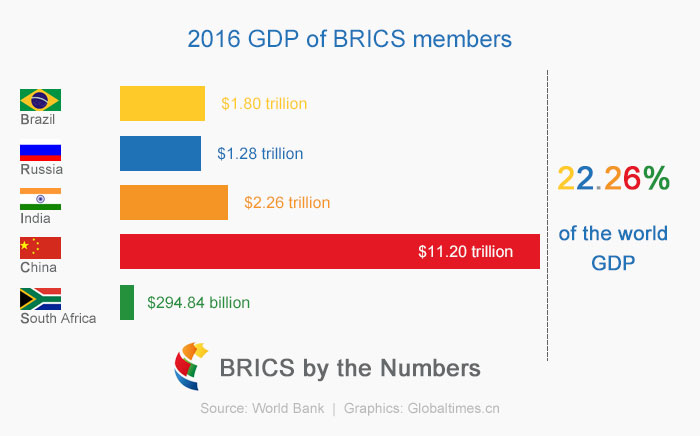
(Globaltimes)
The BRICS countries held a summit conference in Xiamen, China, on September 2017, laying out an ambitious development plan for the next decade. The declaration issued at the end of the conference demonstrates the willingness of representatives of these emerging economies to make a greater contribution to the sustainable and inclusive development of the global economy and to the improvement of global governance.
In recent years, the BRICS countries have taken an ever-increasing share of global economic growth. According to estimates by the International Monetary Fund, the contribution of the BRIC countries to global economic growth was about 60% in 2016. The IMF also estimates that in 2017, emerging economies and developing countries will contribute more than three-quarters of global economic growth. And in the next few years, the contribution of these economies will still account for about 70% of global economic growth.
Emerging economies have not only made great contributions to the global economy in terms of growth, they have also been successful in promoting the growth of international trade. According to estimates by the World Trade Organization, from 2000 to 2015, imports from developing countries increased from 27% of world trade to 41%, and exports increased from 30% to 43%. In 2005 developing countries contributed 24% of global service exports. In 2015, this figure was 39.4%.
Goldman Sachs predicts that by 2050, the top five economies would be composed of the BRIC countries (China, India, Brazil, Russia), and the United States.
As the structure of the global economy changes dramatically, the BRICS countries have expressed a strong desire to participate in and take action on global economic governance. With regard to the existing international system, the BRICS countries have supported multilateralism and promoted domestic reform to make the system more equitable. Whether within the framework of the United Nations, or the G20, the BRICS countries are actively collaborating, seeking to speak with one voice. The BRICS countries have played an active role in promoting global economic growth, fighting the return of protectionism, and strengthening cooperation in the supervision of financial markets.
At the same time, the BRIC countries have created new cooperation mechanisms, like the creation of the new development bank, and emergency mutual aid provisions. This has created a new base of cooperation among emerging countries based on equality. In these new mechanisms, there is no room for intimidation or vetos; equality prevails, with each country entitled to one vote. It is a model of consultative cooperation.
At the Xiamen Summit, BRICS leaders invited several leaders from other emerging economies, to show that the BRICS group is not a closed bloc. Indeed, the new trend of the world economy is the collective rise of emerging economies.
Goldman Sachs predicts that by 2050, the combined GDP of the 11 "Diamond" countries (Mexico, South Korea, Indonesia, Turkey, Iran, Egypt, Nigeria, Bangladesh, Pakistan, the Philippines and Vietnam) will exceed that of the United States, and will double that of the EU.
In the new version of the report "The World in 2050" published by the Price Waterhouse Coopers, the GDP of the 7 new emerging economies (Brazil, China, India, Indonesia, Mexico, Russia and Turkey) already equals that of the former G7 in 2015, based on purchasing power parity. By 2040, the seven emerging economies will be twice as large as the former G-7. In 2050, the EU's GDP will fall below 10% of the global economy, while the United States’ will fall to 12%.
The BRICs also face significant challenges. If they can overcome these challenges, the future development of these countries would be even brighter.
Since the dollar is still the hegemonic currency of the international monetary system, the Federal Reserve's monetary policy has a major impact on the economy. After the end of quantitative easing in 2014, the Federal Reserve entered a cycle of interest rate retrenchment. The changing value of the dollar has caused sharp fluctuations in the international commodity market, and commodity-exporting countries among the BRICS have suffered tremendously from the Federal Reserve's "spillover effects". In the future, the Federal Reserve will reduce its position on the debt market. In addition, the interest rate will be raised as well. All this will cause a big fluctuation in the value of the dollar, the international capital markets, and the markets of the primary products. Only by strengthening monetary cooperation and adopting a swap for the settlement of their international trade could the BRICS countries mitigate the negative impact of the dollar's turmoil on their economies.
Among the BRIC countries, China, Russia and India are major land powers in Eurasia and would inevitably be suspicious of each other. In the past, China's "Belt and Road" initiatives were regarded by Russia with suspicion, particularly its plan to construct an "Eurasian Economic Union". Later, President Vladimir Putin proposed connecting the plan for the Eurasian Union with the Chinese Belt and Road initiative, reducing mistrust between the two powers. China and Russia have cooperated on aviation, spaceflight and arms development. Russia has advantages in industrial design and technologies, but has weaknesses in industrial processing and market exploitation. Cooperation between China and Russia is win-win. The lessons of Sino-Russian cooperation can be translated to Sino-Indian cooperation. If India can join its international development strategy with the Chinese "Belt and Road" initiatives, this will certainly bring more development opportunities to South Asia.
Emerging economies have enormous needs for infrastructure, and the development of consumption and services. Emerging economies have better demographics, are more open minded, more willing to participate actively in international cooperation, more ready to build reasonable coordination mechanisms. On the whole, emerging economies are the main force for promoting a new version of globalization. The BRICS countries have created a new model of mutually beneficial cooperation among emerging economies. This model of South-South cooperation would have effects on other emerging economies. Cooperation among these developing countries will significantly change the outlook of global growth, also affecting the structure of the global economy.
